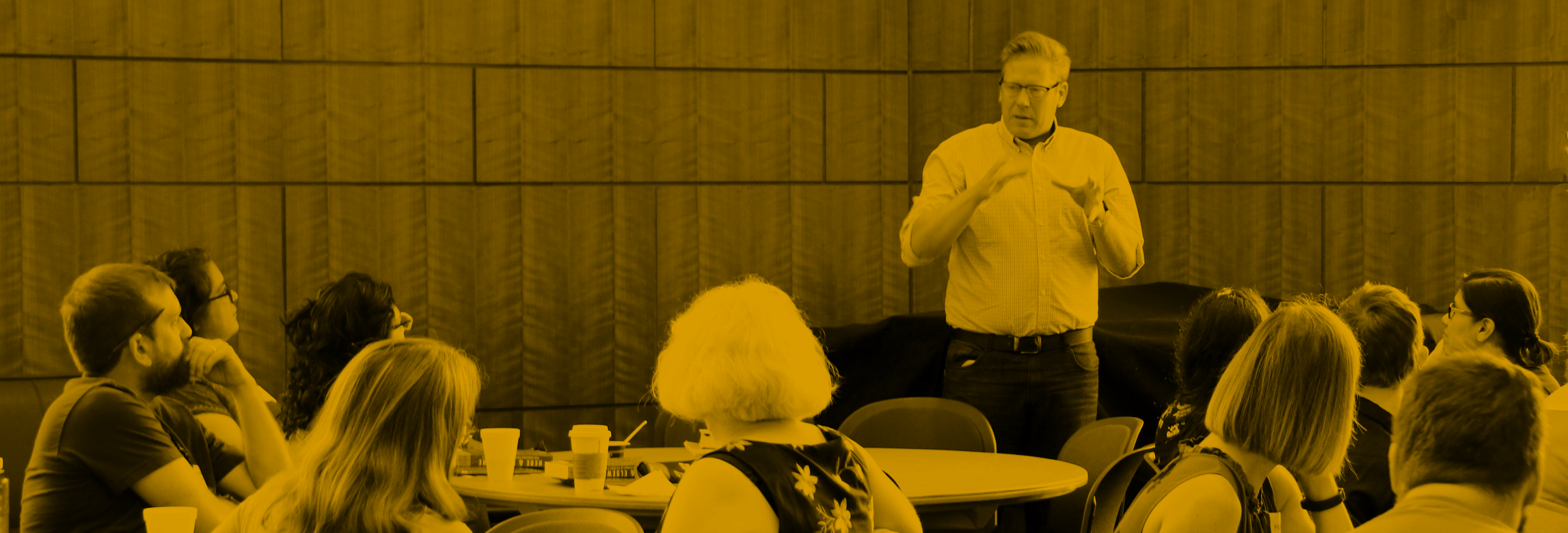
2025 Seminar Offerings
This year, Common Ground Teaching Fellows have the option of four exciting seminars. You will be asked to rank your seminar in order of preference. Please note that while every effort will be made to place you in your first or second choice seminar, space constraints mean we cannot guarantee you your preferred options.
________________________________________________________________________
What We Talk About When We Talk About Stories
Dr. Hayan Charara
What makes for a good short story? This question is best answered by distinguishing short stories from novels, the other dominant fiction form. Novelists have hundreds of pages to build worlds and develop elaborate character trajectories (from cradle to grave over several generations, should they so choose). If the extravagant scope and detail novels accommodate forms part of their appeal, then the allure of short stories lies in their concentrated immediacy.
It is generally true that an effective short story does two things: (1) it tells of something that happens to someone; and (2) it demonstrates a deliberate, congruous relationship between all its elements. In a short story, the “something that happens” impacts a person and alters them in a significant way. Given space constraints, this usually gets focused down to a single event. Over the several hundred pages of a novel, many things can happen to a character, not all of which will impact them significantly or even at all.
And whereas a novel has enough room for loose connections and digressions, everything in a short story is usually bound together tightly. The best short stories demonstrate a harmonious and carefully-wrought relationship between their various elements, suggesting their writers paid attention to what we’ll call “economy”— they have done the most possible with the very little available to them.
In this seminar, you will read and discuss several highly-regarded short stories and, over the course of the week, write one of your own.
Text:
40 Short Stories: A Portable Anthology, edited by Beverly Lawn (any edition is okay)
________________________________________________________________________
Where I Was From: Excavating Place and Self
Dr. Kimberly Meyer
Whether it is a landscape that we have loved, or a city that we have lost; whether it is a home that is in the process of disappearing in one way or another; whether it is a region that we know intimately, or a country to which we traveled and experienced a sense of belonging; whether it offers refuge or unraveling, we can be profoundly shaped by place and feel a kind of umbilical connection.
In this seminar, we will spend time reading writers who are thinking through the geographies and histories of certain places, and their own relationships with them. We’ll explore some of the timely and timeless questions these writers are asking: How does a terrain bend us to itself so that we become a reflection of it? What is lost when we are cut off from the place we were rooted to, both as individuals and as a culture? How can we learn to see more clearly the home we think we know so well? What is our obligation to preserve the wild places?
And we will also practice writing about a place that shaped us as well—a place of our own, the place we were from.
Texts (excerpted):
Where I Was From, Joan Didion
Still (blog), Mary Jo Hoffman
A Sand County Almanac: And Sketches Here and There, Aldo Leopold
Landmarks, Robert MacFarlane
Finding Beauty in a Broken World, Terry Tempest Williams
________________________________________________________________________
The Ambiguity of Parenthood
Dr. Max Rayneard
It is often said parenting is “the most difficult and important job in the world.” In this seminar, we dig beneath the surface of the cliché to grapple critically with a question all parents, in various ways and often daily, ask themselves: “Am I doing this right?” This worry points to a conundrum at the heart of parenthood. There are simply too many variables – an unpredictable world and the individual agency of children chief among them – for parents to know they’re doing it right, yet do it they must. Parenthood promises snuggles, happiness, and heart-brimming rewards, but also deep frustration and terrible fears. Such are the ambiguities of parenthood.
This seminar is not about parenting advice. Rather, it examines “parenthood” as a state of being and “parent” as an identity claim that at times seems to subsume other ways in which people who are also parents know themselves. We will look at various literary and filmic texts in which mothers and / or fathers – biological or otherwise, in various cultural and familial arrangements – experience the ambiguities of parenthood. A seminar for parents of children and children of parents, alike.
Texts:
The Wellspring, Sharon Olds
Night, Mother, Marsha Norman
Things Fall Apart, Chinua Achebe
Foster, Claire KeeganThe Lost Daughter (dir. Maggie Gyllenhaal)
Saving Face (dir. Alice Wu)
________________________________________________________________________
Barbaric Yawps
Dr. Marina Trninic
If you have (secretly) harbored an aversion to poetry – perhaps because of stultifying middle school lessons on, say, the difference between sonnets and villanelles, or iambs and spondees – join this seminar and be freed! “Stop this day and night with me and you shall possess the origin of all poems” Walt Whitman invites us in his dizzying, encyclopedic cataloging of experience, Song of Myself. Our rebellious poet rebels against established conventions in order to celebrate himself and us, as Americans and people, in all our messy glory. In so doing, he bids a, ahem, polite adieu to the highfaluting works of high-brow Europeans in favor of his “barbaric yawp,” a literary aesthetic that extolls his hungry poetic eye and sweaty armpits in equal measure. Building on Whitman’s vision, we will read Allen Ginsberg and Claudia Rankine, covering over 150 years of American experience, to understand what this primal scream tells us about ourselves and our place in the world.
Texts:
Song of Myself, Walt Whitman
Howl, Allen Ginsberg
Citizen, Claudia Rankine